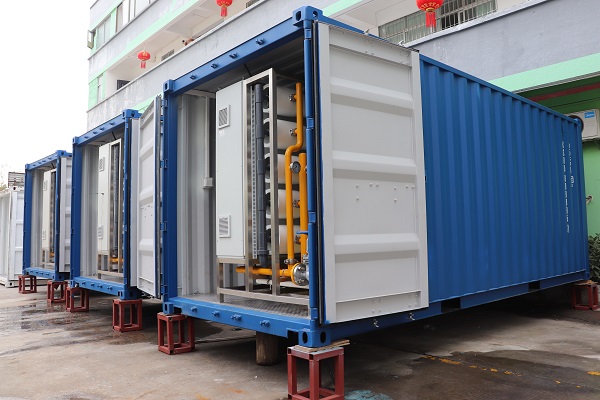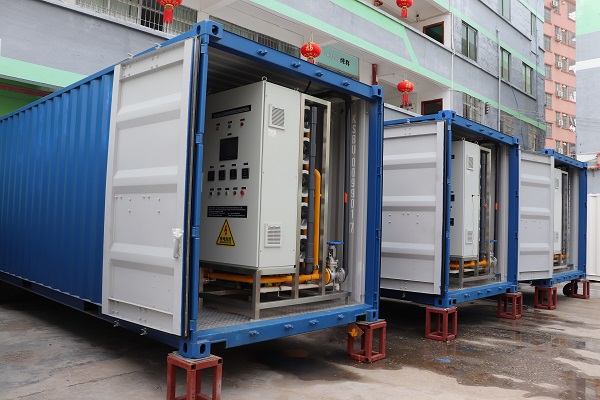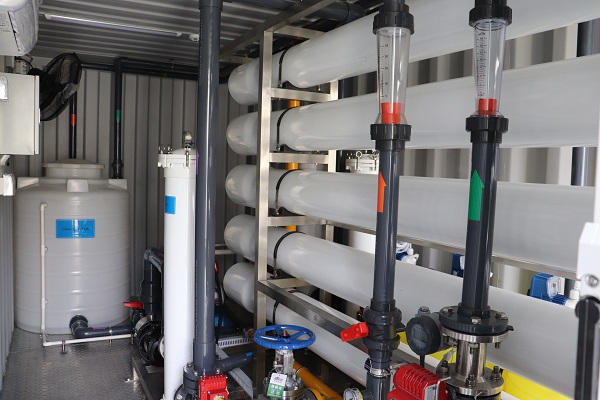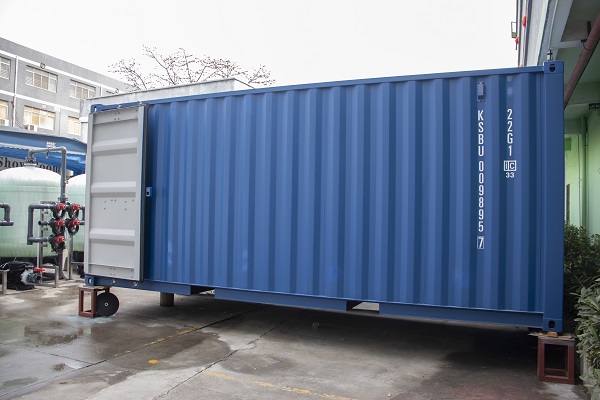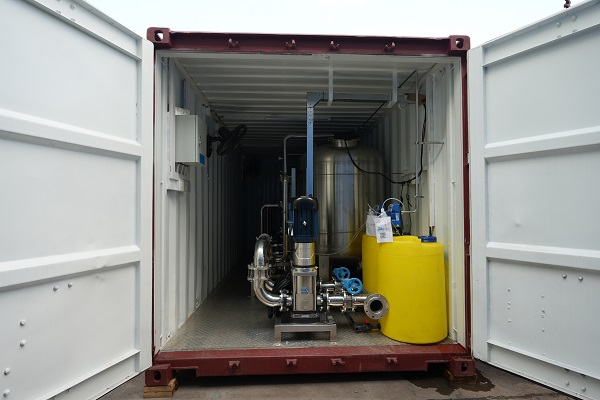Container Water Treatment Systems: Providing Clean and Safe Water Anywhere
Chunke provides Container water treatment systems with high technology.
In today's world, access to clean and safe drinking water is more critical than ever. Whether it's for residential, industrial, or emergency purposes, having a reliable water treatment system is essential. One innovative solution that has gained popularity is container water treatment systems. These systems, often equipped with reverse osmosis (RO) technology, offer a portable and efficient way to purify water, including sea water desalination. In this comprehensive guide, we will explore the benefits, features, and applications of container water treatment systems, highlighting their importance in providing clean and safe water anywhere.
1. Understanding Container Water Treatment Systems
Container water treatment systems are self-contained units that can be easily transported and deployed to various locations. These systems, housed in ISO containers of different sizes, are designed to treat different water sources, including wells, rivers, lakes, ponds, and even sea water. The container units are equipped with advanced water treatment technologies, such as reverse osmosis, ultrafiltration, and nanofiltration, to remove impurities and contaminants from the water, ensuring it meets the highest standards of purity and safety.
1.1 The Advantages of Containerization
Container water treatment systems offer several advantages over traditional built-in plant room installations. These advantages include:
Plug and play unit: Containerized systems come pre-assembled and ready to use, minimizing the installation time and effort required.
Quick installation: With limited civil work involved, these systems can be up and running in a fraction of the time compared to conventional treatment plants.
Compact footprint: The compact size of container units allows for easy transportation and placement in tight spaces, making them ideal for both permanent and temporary water treatment needs.
Mobility: Container systems can be easily moved from one location to another, making them highly versatile and suitable for construction sites, remote areas, and emergency situations.
Turnkey delivery: Containerized systems come complete with all necessary components, including piping, cables, and air conditioning, ensuring a hassle-free and comprehensive solution.
1.2 Components of Container Water Treatment Systems
Container water treatment systems consist of various components and equipment working together to ensure the efficient and effective purification of water. These components may include:
Intake and pre-treatment: The system begins by taking in water from the source, which goes through a series of pre-treatment processes to remove suspended solids, organic matter, and other impurities.
Reverse osmosis: A crucial part of many container water treatment systems is the reverse osmosis (RO) unit. RO utilizes semi-permeable membranes to separate dissolved salts, minerals, and other contaminants from the water, producing clean and purified water.
Ultrafiltration and nanofiltration: In addition to RO, some systems may incorporate ultrafiltration (UF) and nanofiltration (NF) technologies. UF and NF membranes are effective in removing bacteria, viruses, and larger particles, further enhancing the water quality.
Disinfection: After the water passes through the membrane filtration stage, it may undergo disinfection processes, such as chlorination or ultraviolet (UV) treatment, to kill any remaining microorganisms and ensure the water is safe for consumption.
Storage and distribution: The treated water is then stored in tanks within the container unit, ready for distribution. Depending on the specific application, the system may include pumps, valves, and control systems to regulate the flow and pressure of the water.
2. Applications of Container Water Treatment Systems
Container water treatment systems have a wide range of applications, making them suitable for various industries and situations where clean and safe water is essential. Let's explore some of the primary applications of these systems:
2.1 Residential and Community Water Supply
In areas where access to clean drinking water is limited or unreliable, container water treatment systems can provide a reliable and sustainable solution. These systems can be set up in communities, villages, or rural areas to ensure a constant supply of safe drinking water. Whether it's for a small community or a large residential complex, containerized water treatment systems can be tailored to meet the specific needs and water demands of the population.
2.2 Industrial Water Treatment
Industries that require a significant amount of water for their processes can benefit from container water treatment systems. These systems can be used for various industrial applications, including:
Tertiary treatment of wastewater: Containerized systems can be employed to treat and recycle wastewater from industrial processes, reducing the need for freshwater intake and minimizing environmental impact.
Production of ultra-clean water: Some industries, such as pharmaceuticals or electronics manufacturing, require ultra-pure water for their operations. Container systems with advanced filtration technologies can provide the necessary water quality for these specialized applications.
2.3 Emergency Response and Disaster Relief
In emergency situations, such as natural disasters or humanitarian crises, access to clean water becomes a matter of life and death. Container water treatment systems can be rapidly deployed to affected areas, providing immediate access to safe drinking water. These systems can be set up in disaster response centers, refugee camps, or remote locations where clean water is scarce. Their mobility and quick installation make them invaluable in emergency response efforts.
2.4 Construction Sites and Remote Locations
Construction sites and remote locations often lack access to clean water sources. Container water treatment systems can be transported to these sites to provide a reliable and on-site water supply. They can be used for drinking water, as well as for various construction activities, such as concrete mixing, dust control, and equipment cleaning. The mobility and compact design of container systems make them well-suited for these temporary applications.
3. Benefits of Container Water Treatment Systems
Container water treatment systems offer several benefits that make them a preferred choice in many water treatment applications. Let's explore some of the key advantages:
Versatility: These systems can treat water from various sources, including wells, rivers, lakes, and even sea water. This versatility allows them to be deployed in different locations and adapt to changing water quality conditions.
Portability: Container systems are designed for easy transportation and installation, making them suitable for both permanent and temporary water treatment needs. Their mobility allows for quick deployment and relocation as required.
Highly efficient: Equipped with advanced water treatment technologies, such as reverse osmosis, ultrafiltration, and nanofiltration, container systems can achieve high levels of water purification and meet stringent quality standards.
Reliability: Containerized systems are designed for durability and continuous operation, even in challenging environmental conditions. They are built to withstand harsh weather, temperature fluctuations, and other external threats, ensuring reliable and uninterrupted water treatment.
Cost-effective: Container water treatment systems offer a cost-effective solution compared to building permanent treatment plants. They require minimal civil work, have lower maintenance costs, and can be easily scaled up or down based on the water demand.
Ease of operation: These systems are designed for user-friendly operation, requiring minimal technical expertise. They come with integrated control panels and monitoring systems, allowing for easy management and adjustment of water treatment parameters.
4. Selecting the Right Container Water Treatment System
Choosing the right container water treatment system depends on several factors, including the water source, desired water quality, flow rate requirements, and specific application needs. When selecting a system, consider the following:
Water source: Determine the characteristics of the water source, such as salinity levels, suspended solids, and organic matter. This will help determine the appropriate treatment technologies required.
Water demand: Calculate the required flow rate and capacity of the system based on the anticipated water demand. Consider factors such as population size, industrial processes, or emergency response requirements.
Quality standards: Identify the desired water quality standards and regulatory requirements that need to be met. This will help determine the level of treatment and the specific technologies needed.
Mobility and installation: Assess the ease of transportation and installation of the system. Consider factors such as container size, weight, and the availability of suitable infrastructure at the installation site.
Maintenance and support: Consider the availability of maintenance services and technical support for the system. Ensure that spare parts, consumables, and technical expertise are readily accessible.
5. Conclusion
Container water treatment systems offer a flexible, portable, and efficient solution for providing clean and safe water in various applications. Whether it's for residential, industrial, or emergency purposes, these systems equipped with advanced water treatment technologies like reverse osmosis can ensure the purification of water from different sources, including sea water desalination. With their versatility, portability, and reliability, container water treatment systems play a crucial role in meeting the growing demand for clean water worldwide. By investing in these innovative solutions, we can ensure access to clean and safe water anywhere, anytime.
References
"Containerized Mobile Water Treatment Systems" - Applied Membranes
"The Stand-Alone Drinking Water Production" - Unknown Author
"Container, Mobile Treatment Plants for Drinking and Technological Water" - Unknown Author
"Lenntech Containerized Water Treatment" - Lenntech
